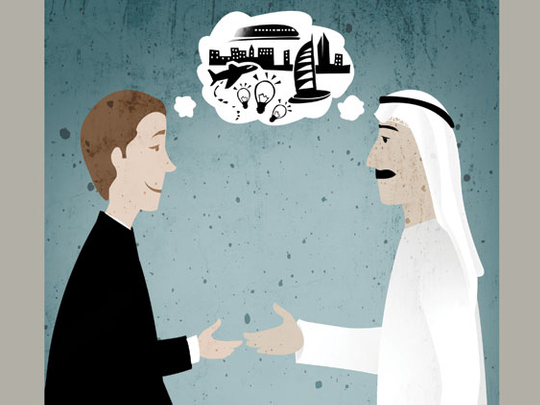
The GCC is making outstanding efforts to diversify their economies and lessen dependence on oil as the basic source of income and for energy needs. In recent years, successes were achieved on both fronts.
This drive is justified at more than one level, especially after the oil and energy markets went through dynamic developments and imposed new challenges. This has called for a re-evaluation of the historical relationship between oil and development in the region.
The challenges cannot be faced without a long-term strategy which takes into account the overall local and international changes in energy production. They must also aim to set up directions to be followed to minimise the negative aspects on developments.
The latest developments in the energy sector raise many questions that need to be analysed. There have been extensive discussions regarding the production of oil and gas shale in the US and other countries, which would impose a real challenge to oil and gas in the areas of price and production.
Impact on gas prices
Despite the fact that the effect of gas and oil shale on oil prices is still limited, its impact on gas prices far-reaching. The price of a gas tonne in forward contracts has dropped from $11 per gallon five years ago to $3 currently, and inflicted losses on gas exporters.
Regarding oil, the limitation of oil shale reserves discovered until now and its high production cost — between $ 50-75 per oil shale barrel against less than $20 for an oil barrel in the Gulf — limits its effects on supplying the global markets.
The high production costs point to the difficulty of dropping oil prices below $80 per, which fits the oil exporting countries and covers their development needs in the short run.
They also exclude expectations that the production of oil shale will lead to a drop in oil prices that could yet create financial challenges for oil exporting countries.
That possibility is unlikely as of now because of the production costs. However, other possibilities may arise where new technology allows for the reduction in such costs. But this could take a long time to be realised.
It is also expected that the increase in demand of oil will lead to production of 105 million barrels a day in 2030 compared with 89 million today.
Among other things, the increase in producing oil and gas shale will lead to a drop in US oil and gas imports. The US was considered the biggest global oil and gas importer in 2011; however, this shrunk to 6 million barrels a day in December last.
Thus, China became the major oil importer around the world with 6.12 million barrels of imports a day, according to the Financial Times. This change took place because of the US’s increase in oil and gas shale production despite protests by environmentalists who rail against the emission of the environmentally-harmful Methane gas.
Apart from oil shale, there are the effects of the expected increase of oil exports in countries such as Iraq and Libya. Iraq is seeking to double its oil exports to 6 million barrels a day by 2016. Libya’s oil production is also expected to increase significantly, especially if security issues settle down.
GCC countries are also expected to boost their production, in addition to countries outside of Opec such as Russia, Brazil, and Venezuela.
However, this challenge is considered less effective because of the expected global demand increase on oil of 18 per cent by 2030. Many countries inside Opec and outside will not be able to increase productions due to the limitation of their oil reserves. Oil production in Egypt and Qatar should witness a decline if new oil discoveries are not made.
The developments in the production of renewable and alternative energy should be noted here. These occupy an important space in the changes witnessed in the global energy industry.
Development strategies
GCC countries will need to reformulate their development strategies while taking all possibilities into consideration. This will call for faster efforts to bring about economic diversity, thus finding alternative income sources, either by developing non-oil sectors or imposing taxes such as VAT.
At the same time, GCC countries may restructure government expenditure, lifting pressure through allowing the private sector to play a bigger role in economic diversity, and providing jobs for nationals.
Apart from the special efforts by each country, the integration of GCC economies, applying signed treaties, setting up the joint market, unifying financial policies, carrying out strategic projects in areas of infrastructure, communication, industry and co-operating in the fields of petrochemicals may contribute positively.
— Dr Mohammad Al Asoomi is a UAE economic expert and specialist in economic and social development in the UAE and the GCC countries.












